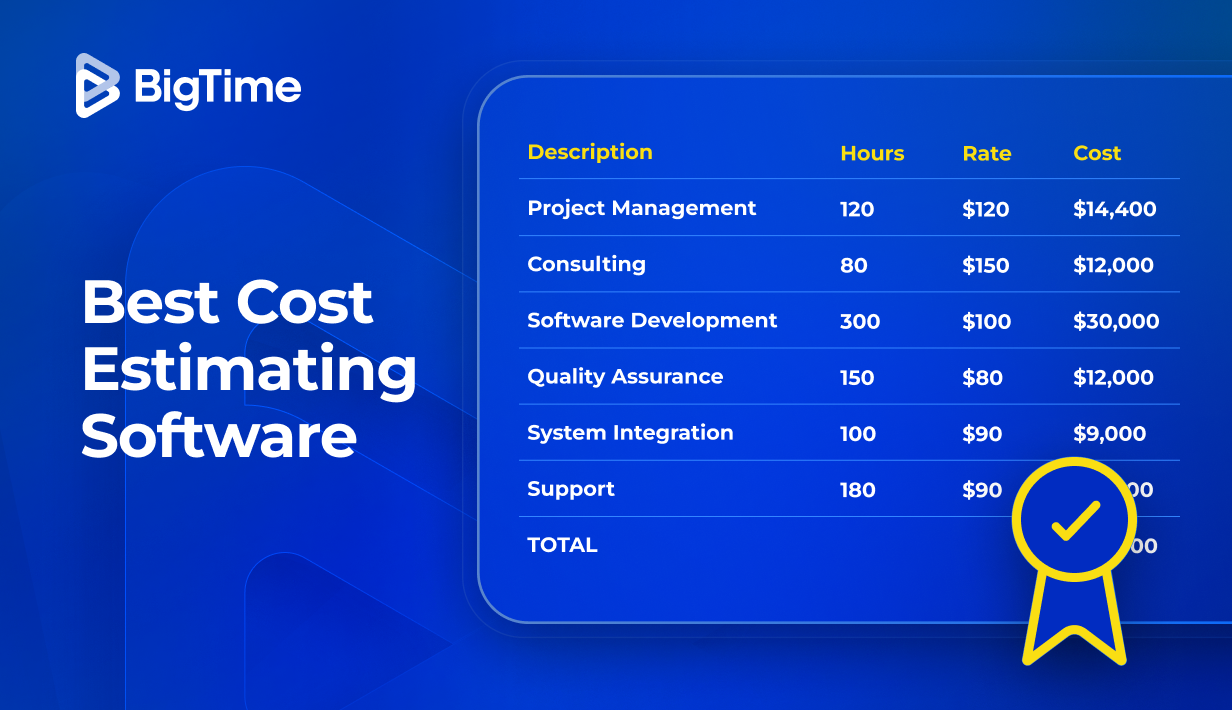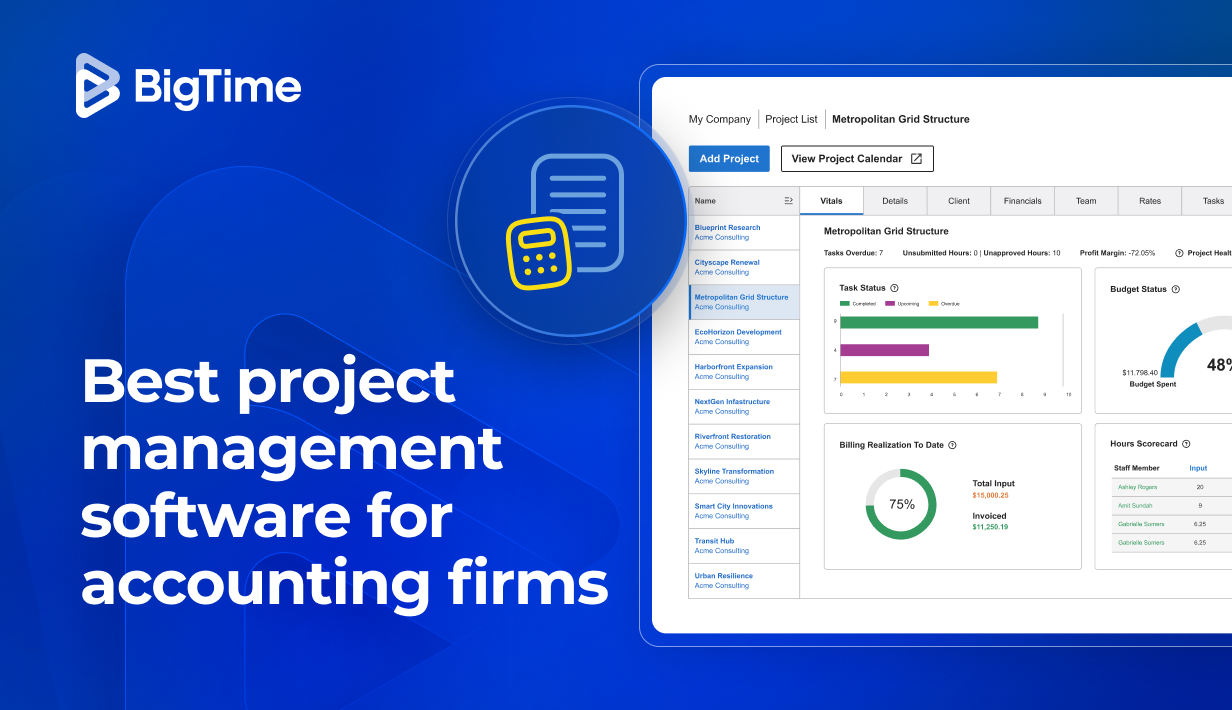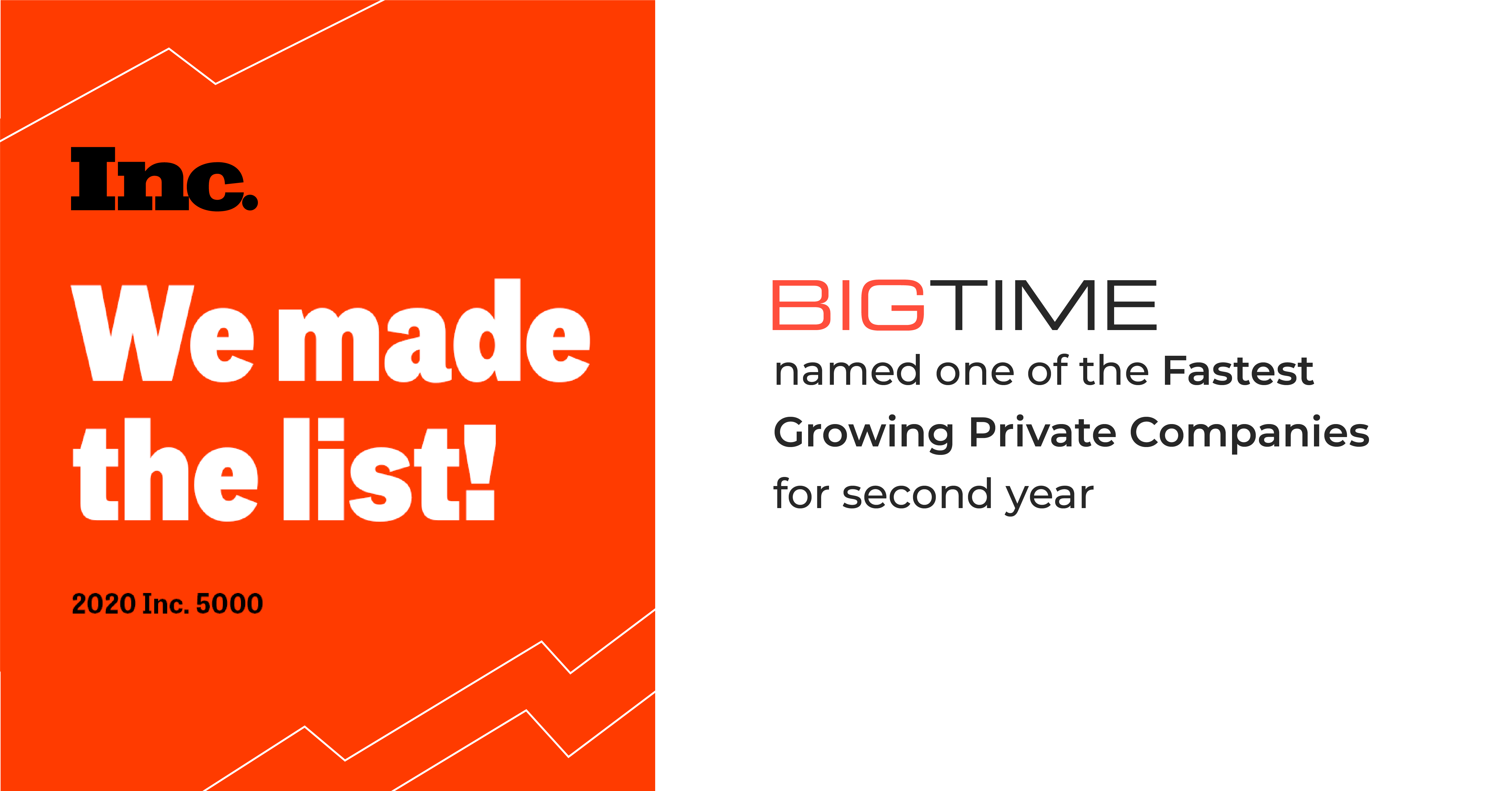Professional services firms, including those in the construction industry, engineering, architecture, consulting, and IT services, face mounting pressure to deliver projects on time and within budget. Outdated cost estimating software and disconnected systems often lead to inaccuracies, eroded profit margins, and costly scope creep. This guide explores the best cost estimating software tools available in 2026. It reviews key features firms should look for, compares top solutions on the market, and explains why BigTime is the preferred platform for mid-sized and growing professional services organizations.
What Is Cost Estimating Software?
Cost estimating software helps firms accurately forecast the expenses associated with a project, from labor and materials to overhead and vendor fees. These tools eliminate the need for manual spreadsheets and disconnected data sources, offering centralized, real-time estimates that improve budgeting and client transparency.
Why Cost Estimating Software Matters:
- Boosts budgeting accuracy by using historical data and real-time inputs
- Improves decision-making by surfacing insights on margins, resourcing, and risk
- Reduces revenue leakage by aligning projected and actual costs
- Accelerates proposal timelines with reusable templates and automated workflows
Key Features in Leading Cost Estimating Software Tools
Professional services firms require estimating tools that align with real-time project data, integrate seamlessly with existing systems, and scale with business growth. The most effective cost estimating software shares several common features that help firms operate more efficiently and profitably.
Real-Time Cost Tracking
This feature allows teams to continuously monitor project budget, including labor, materials, and overhead. By capturing actual costs as they occur, firms can quickly identify overruns, adjust resourcing, and maintain better control over financial outcomes.
Integration with Accounting and Project Management Platforms
A top-tier cost estimation tool should integrate with financial systems, such as QuickBooks invoicing, and project management tools, like Microsoft Project or Salesforce. These integrations eliminate duplicate entries, ensure data consistency, and support comprehensive project planning and reporting across departments.
Customizable Estimation Templates
Reusable templates allow firms to quickly generate detailed estimates for similar project types or clients. This reduces setup time, standardizes pricing practices, and improves the accuracy and speed of proposal delivery.
Forecasting and Budget Comparison
Estimating software should enable users to create forecasts and compare them against real-time actuals. This functionality enables project managers and finance leaders to identify trends, make informed decisions, and sustain profitability throughout the project lifecycle.
Multi-Currency and Tax Support
For global firms or those with international clients, multi-currency and tax configuration is essential. This feature helps ensure accurate estimates across various geographies and regulatory environments, thereby avoiding conversion errors and compliance issues.
Mobile Access
Mobile access allows employees to log data, adjust estimates, and monitor budgets from the field or remote locations. This flexibility is especially valuable for distributed teams or firms with on-site client work, ensuring data is always current and complete.
The Best Cost Estimating Software for 2026 Reviewed
Here’s a detailed comparison of the top cost estimating software platforms available in 2026, evaluating their features, pros, and considerations for professional services firms.
BigTime
BigTime is a leading PSA platform built specifically for professional services firms. It combines time tracking, expense management, project budgeting, and cost estimation into a single, streamlined interface. With powerful integrations and customizable features, BigTime supports firms from pre-sales through delivery and invoicing—all from a centralized database..
Why BigTime Cost Estimating Software Stands Out
Integrated Estimation Tools
BigTime enables users to build estimates based on actual time, resource allocations, and expense data within the same platform used for project tracking and invoicing. This tight integration reduces errors and ensures cost estimates reflect real project workflows. It also streamlines handoffs between estimating, budgeting, and billing teams.
Customizable Templates
BigTime offers reusable estimation templates that can be tailored by client, project type, or pricing model based on historical project data. This helps firms streamline the estimation process, standardize proposals and bid packages, accelerate turnaround times, and maintain consistency across teams. It also reduces manual work and supports scalable estimating practices.
Real-Time Budget Tracking and Forecasting
Users can compare budgeted versus actual costs in real time using visual dashboards and automated alerts. This visibility enables project teams to course-correct before costs spiral, thereby protecting margins and ensuring client satisfaction. Forecasting tools also support proactive planning across multiple projects.
An example of project estimates for different scenarios in BigTime
Accounting and CRM Integrations
With seamless integrations to QuickBooks, Sage Intacct, Xero, Salesforce, and other systems, BigTime syncs financial and project data automatically. This eliminates the need for manual reconciliation and reduces the likelihood of data entry errors. It also improves reporting accuracy and accelerates the billing cycle.
Mobile App for Cost Estimating On the Go
BigTime’s mobile app allows users to input time, log expenses, and update project budgets from any device with cloud-based access. This supports remote and field-based teams who need real-time access to project financials. Mobile access ensures timely data entry and more accurate estimates.
Intuitive Interface with Minimal Training Required
BigTime is built for busy professionals and requires little training to get started. The platform’s clean design and customizable database views make complex estimating workflows easy to manage and navigate. Teams can onboard quickly and focus on delivering profitable work, not learning software.
Why BigTime Is the Software Professional Services Firms Choose
Professional services firms choose BigTime because it does more than generate cost estimates; it connects your entire project lifecycle in an intuitive, all-in-one solution. From initial proposal through project delivery and invoicing, BigTime’s advanced features give firms complete visibility into costs, resources, and profitability.
BigTime is specifically built for the needs of consulting, engineering, architecture, and IT services firms. It saves time and eliminates the guesswork and manual processes associated with spreadsheet-based workflows, delivering more accurate estimates based on real cost data and historical information. With tools for resource planning, time tracking, expense capture, and billing all tightly integrated, BigTime enables firms to deliver profitable work at scale.
Firms also appreciate the flexibility to analyze estimates for a wide range of project types, including fixed-fee, time-and-materials, and retainer contracts. Its customizable templates and accounting integrations ensure that cost elements flow directly into your financial systems, improving forecasting and reducing risk.
Backed by a responsive onboarding and support services team, BigTime makes it easy to transition from legacy systems to a modern, scalable software solution. That’s why it remains the cost estimating software of choice for professional services firms focused on growth, accuracy, and efficiency.
GanttPRO
A visually-oriented project management tool that includes cost planning and budgeting features, GanttPro is designed around Gantt charts, making it easy to map out project timelines and assign resources. A favorite among construction cost estimating software, it streamlines the estimating process via Gantt chart visualizations.
Key Features of GanttPro
Gantt-Based Budgeting
Visual Gantt charts help teams plan project timelines and assign cost values to tasks. This visual interface is good for tracking progress and dependencies alongside budget allocations.
Resource and Workload Management
Assign team members to tasks based on availability and track their workload in real time. This helps ensure even distribution of effort and avoids over-scheduling.
Basic Budget Tracking
Users can input planned costs and compare them to actual time tracked against tasks. While this gives a high-level cost overview, it lacks detailed financial reporting.
Summary
GanttPRO is a great entry-level project planning tool with a clean interface and effective visual tracking. It works well for teams who want to align scheduling and budgeting in one view. It even offers a free trial. However, its cost-estimating functionality is limited; there are no integrated financial tools or deep forecasting features, making it insufficient for firms that need detailed cost breakdowns or complex pricing models.
Galorath (SEER Suite, SEERai)
Galorath’s SEER suite is a family of estimation tools used primarily in aerospace, defense, and large-scale engineering. These tools leverage predictive modeling and AI to support comprehensive estimates for projects.
Key Features of Galorath
AI-Driven Predictive Modeling
Galorath’s SEER suite uses historical and statistical models to generate detailed project forecasts. The platform supports a wide range of estimation inputs, including risk variables and productivity factors.
Multi-Domain Cost Estimation
Designed for complex industries such as aerospace, defense, and engineering, SEER tools enable users to model costs across hardware, software, IT, and manufacturing domains.
Risk Analysis and Scenario Planning
Built-in risk tools help users evaluate the probability of budget overruns and compare best- and worst-case scenarios. This makes the tool especially valuable for long-term or high-risk projects.
Summary
Galorath’s SEER suite is one of the most powerful tools for organizations with high-complexity cost estimating needs. Its deep forecasting, AI capabilities, and risk modeling are top-tier. But it comes with a steep learning curve, high cost, and unnecessary complexity for mid-sized professional services firms that don’t require aerospace-grade estimation.
Kantata (formerly Mavenlink)
Kantata is a robust PSA platform with forecasting, resource management, and cost tracking features. It’s geared toward larger firms managing multiple complex projects.
Key Features of Kantata
Advanced Project Forecasting
Kantata allows users to forecast resource utilization and financial performance across multiple engagements. It combines historical data with predictive insights to improve planning accuracy.
Multi-Project Budgeting
Track budgets at the task, project, or portfolio level. Real-time budget alerts help project managers stay within scope and make timely adjustments.
Integration Ecosystem
Kantata connects with financial systems, ERPs, and CRMs to centralize data across the project lifecycle. These integrations support consistent reporting and reduce administrative overhead.
Summary
Kantata is built for larger organizations that manage multiple complex projects across departments. It excels in forecasting and cross-functional resource planning. However, its interface can be overwhelming, setup is time-intensive, and the pricing may be out of reach for smaller firms looking for straightforward cost estimation tools.
Replicon
Replicon offers cloud-based time and project cost tracking tools specifically designed for professional services and enterprise teams. While primarily known for time tracking, it offers cost estimation and budgeting capabilities.
Key Features of Replicon
Time and Expense Capture
Replicon allows users to track time, expenses, and time off across multiple projects. This data flows directly into cost reports, giving visibility into real-time burn rates.
Budget vs. Actual Cost Reports
Visual dashboards highlight discrepancies between budgeted and actual hours or dollars. These reports help project leaders stay on track and avoid cost overruns.
Client and Project-Level Analytics
Generate reports by project, client, or department. This granularity supports decision-making across both financial and operational levels.
Summary
Replicon offers a clean, user-friendly interface that excels in time and expense tracking. It provides essential visibility into project financials, making it a suitable choice for firms that require straightforward budgeting and utilization reporting. However, it lacks robust estimation tools and is better suited as a time-tracking solution rather than a comprehensive cost-estimating platform.
Accelo
Accelo is a PSA system designed for service-based businesses that integrates sales, projects, and billing. It includes basic cost estimating within its broader suite of tools.
Key Features of Accelo
Automated Sales-to-Project Handoff
Create project estimates directly from approved sales quotes. This automation reduces duplicate entry and improves pipeline visibility.
Real-Time Cost and Profit Tracking
Monitor the financial performance of projects, including costs, margins, and billable time. Accelo gives users a high-level view of profitability by client and project.
CRM and Project Integration
Seamlessly links project data with client communication and CRM records. This helps firms maintain context and better manage client expectations.
Summary
Accelo is suitable for service-based businesses that need unified sales, project, and billing workflows. Its automated handoffs and client management features are strong differentiators. However, its cost estimation tools are less customizable and may not meet the complexity needs of larger professional services firms with nuanced rate structures or resource planning requirements.
Scoro
Scoro is an all-in-one business management platform combining project management, finance, and collaboration tools. It offers lightweight cost estimation features as part of its financial suite.
Key Features of Scoro
Budgeting and Time Allocation
Users can set budgets for projects and allocate time and tasks to team members accordingly. This supports time-based billing models and helps monitor utilization.
Financial Dashboards and KPIs
Scoro includes prebuilt dashboards for tracking revenue, costs, and profitability in real time. Custom widgets allow for tailored views by department or role.
Business Management Suite
Beyond cost estimating, Scoro offers CRM, invoicing, and calendar management tools. It functions as a central hub for business operations.
Summary
Scoro is a good fit for firms seeking an all-in-one platform with light estimation and budgeting capabilities. Its dashboards and project budgeting tools offer high-level financial insights. Still, the estimating functionality isn’t as robust or customizable as firms might need for large, complex, or fixed-fee projects.
FunctionFox
FunctionFox targets creative and marketing teams with simple project management and time tracking. It includes cost tracking for project estimates, but lacks advanced capabilities.
Key Features of FunctionFox
Basic Project Estimating
Users can create quotes based on hourly rates and task estimates. This feature is ideal for small firms or freelancers who bill based on time spent.
Time and Expense Tracking
Track hours worked and expenses incurred against project budgets. FunctionFox keeps this data simple and easy to access via an internet connection.
Reporting and Utilization Tracking
Generate reports on team productivity, budget usage, and client billing. Reports are straightforward but may lack the depth of more advanced platforms.
Summary
FunctionFox is well-suited for creative teams or small consultancies that need lightweight tools for estimating and tracking time. It’s user-friendly and affordable, but lacks the advanced forecasting, automation, and integrations needed for professional services firms managing complex projects or multi-phase engagements.
Discover How BigTime Can Transform Your Cost Estimating
Firms that rely on spreadsheets and disconnected tools often struggle with missed margins, slow proposals, and inaccurate estimates. BigTime cost estimating offers an all-in-one software solution specifically designed for project-based professional services firms, integrating time tracking, expense capture, and budgeting into a seamless workflow.
With BigTime, you can generate accurate estimates based on real cost data, forecast future costs, and ensure every cost element is accounted for. Whether you’re managing fixed-fee engagements or time-and-materials contracts, BigTime helps you create more accurate completed estimates, reduce manual errors, and improve profitability.
Experience the best cost estimating software for professional services. Try BigTime’s free trial for 14 days.
FAQs: Cost Estimating Software for Professional Services
What is cost estimating software?
Cost estimating software is a digital tool used to calculate and forecast the total costs of a project, including labor, materials, overhead, and other cost elements. These tools help ensure accurate estimates and better decision-making throughout the project lifecycle.
Why is project cost estimation software important for professional services firms?
Firms need precise, data-driven cost estimates to maintain profit margins and avoid budget overruns. The best cost estimating software streamlines budgeting, reduces errors, and integrates with your accounting and project management systems.
How does BigTime cost estimating improve accuracy?
BigTime uses real-time cost data from time tracking, expenses, and resource allocations to inform estimates. This integration eliminates guesswork, allowing firms to build more accurate estimates with confidence.
Can BigTime help compare estimated vs. actual project costs?
Yes. BigTime’s project cost estimation software includes dashboards and variance reports that show estimated costs against actuals in real time, helping you monitor financial performance and improve forecasting.
Is BigTime cost estimating suitable for both small and mid-sized firms?
Absolutely. BigTime is scalable and ideal for firms with 5 to 500+ employees. It adapts to your team’s workflow, making it a top cost estimating software solution for growing professional services firms.
What types of projects can be estimated using BigTime?
BigTime supports a wide range of professional services projects, including consulting, engineering, IT services, and architecture. You can estimate fixed-fee, time-and-materials, or retainer-based projects using custom templates and rate models.
Does BigTime integrate with accounting systems like QuickBooks or Sage Intacct?
Yes. BigTime integrates seamlessly with QuickBooks (Online and Desktop), Sage Intacct, Xero, and more. This ensures alignment between your cost estimates and financial reporting.
Can I customize estimation templates in BigTime?
Yes. Users can create, save, and reuse customizable templates based on project type, client, or service offering. This reduces manual effort and helps teams produce faster, more consistent estimates.
Does BigTime support mobile estimating and project updates?
Yes. BigTime’s mobile app allows users to log time, update estimates, and track expenses on the go. This ensures that your cost estimating software remains flexible and accessible, regardless of where your team works.
How does BigTime help teams reduce errors in the estimation process?
By centralizing all project data, including time, expenses, and resource plans, BigTime eliminates siloed tools and reduces manual entry. This leads to more accurate estimates, fewer costly mistakes, and more data-driven decisions.
How does BigTime complement an ERP system for growing firms?
BigTime integrates with numerous popular ERP systems and other software applications. It offers time tracking, expense management, budgeting, and invoicing tailored specifically for professional services firms. It enhances accuracy by automating data entry, approvals, and reporting, reducing the risk of manual errors that often occur in more complex, time-consuming systems.
For firms managing large projects or bidding on more projects, BigTime provides tools to generate competitive bids using historical performance data and real-time pricing insights. This allows teams to quote confidently while maintaining profitability. By streamlining processes that typically drain valuable time, BigTime empowers firms to scale efficiently and respond faster to new opportunities.




